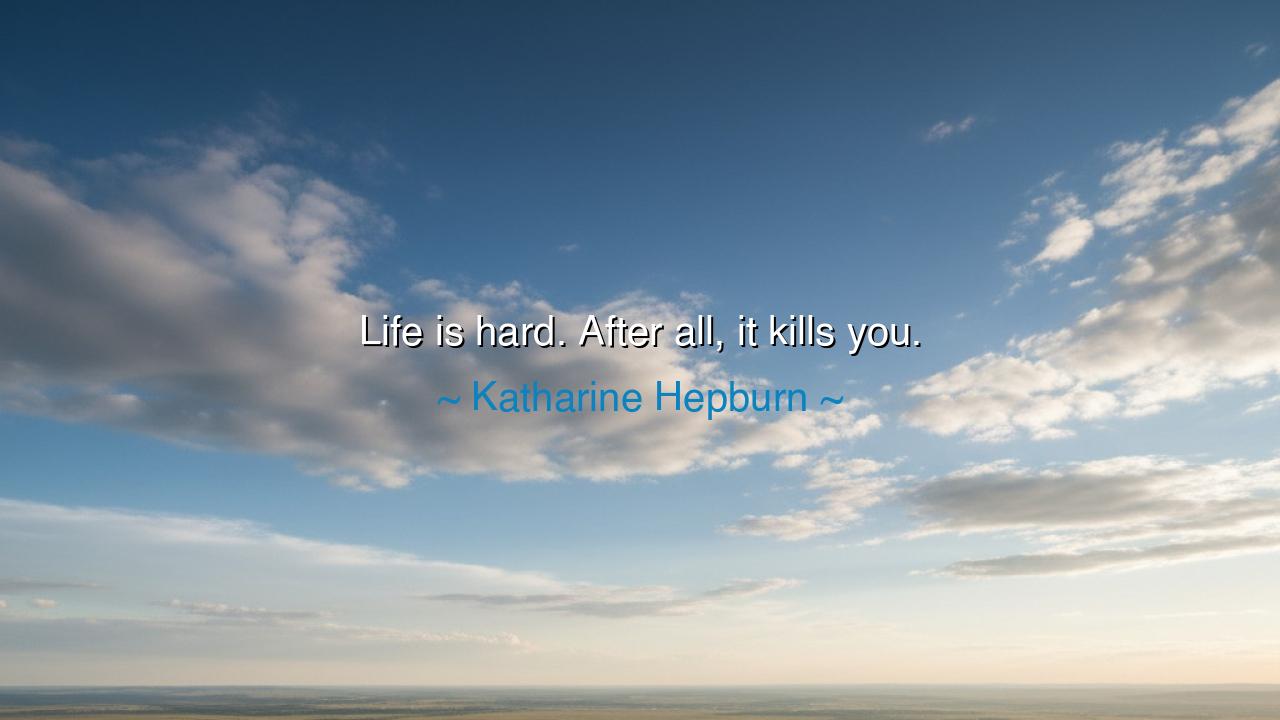
Life is hard. After all, it kills you.






When Katharine Hepburn said, “Life is hard. After all, it kills you,” she captured a truth that has echoed through the ages — that life, for all its beauty and joy, is a battle that ultimately leads to death. This stark realization, while seemingly grim, carries a profound wisdom. Hepburn, known for her fierce independence and unapologetic character, was not simply stating the obvious; she was reminding us of the fragility of life and the inevitability of its end. Yet, beneath the weight of this statement lies a deeper, more heroic truth: the struggle of life, though difficult, is what shapes us into who we are. It is in facing the hardship and pain that we find meaning and growth.
In the ancient world, philosophers like Socrates and Epicurus grappled with the harsh realities of life and death. Socrates, in his dialogues, often discussed the nature of mortality, encouraging his students to live virtuous lives in light of their inevitable death. He believed that wisdom comes not from avoiding the fact of our mortality, but from embracing it, using the awareness of death to live a life of purpose. Similarly, Epicurus, though often misinterpreted, spoke of the value of seeking pleasure through simplicity and understanding of the transient nature of life. Both philosophers recognized that life’s struggle and its eventual end are part of the natural order, and that it is in acceptance of this fact that we find peace. Hepburn, through her sharp wit, taps into this ancient wisdom, underscoring the difficulty of life and the inevitable conclusion it all leads to.
The origin of Hepburn’s quote is rooted in her own life and experiences, which were marked by challenges, both personal and professional. She lived through the loss of loved ones, personal failures, and the evolving demands of Hollywood. Hepburn’s candidness about life’s hardships reflects the reality that no amount of fame or success can shield us from the struggles of human existence. Her statement, while seemingly dark, conveys a deep understanding that life’s journey is not easy, but it is through the struggles — the moments of loss, suffering, and failure — that we come to understand the fullness of being alive. The difficulties we face, far from diminishing us, become the very things that make our lives rich with meaning.
In a historical context, this truth about life’s inherent hardship can be found in the epic tales of Homer’s Iliad and Odyssey. The heroes in these stories, though blessed with great abilities and glorious deeds, are also marked by their suffering and eventual death. Achilles, the greatest of the Greek warriors, was fated to die young, his life defined by his bravery and his sorrow. His struggle, and the awareness of his mortality, shapes his decisions and his character. Like the heroes of ancient myth, we too must confront the reality of our finite existence, knowing that life’s hardships are a necessary part of our journey. Hepburn’s words echo this idea: life is hard, but it is in facing that hardship that we find our greatest strength and purpose.
The meaning of Hepburn’s quote is not to be morbid or to dwell on the inevitability of death, but rather to accept it and use it as a catalyst for living fully. By acknowledging the impermanence of life, we are encouraged to seize the day, to face our struggles with courage, and to find meaning even in the most difficult moments. Life may indeed be hard, but it is in the battle against adversity that we find our purpose. Hepburn’s humor is a way to cope with the tension of life’s fleeting nature — to confront mortality not with fear, but with a sense of acceptance and resilience.
The lesson in Hepburn’s quote is a call to embrace the full spectrum of the human experience — the highs and the lows, the victories and the defeats. The struggles we face are not signs of failure, but opportunities to grow, to learn, and to connect with our shared humanity. The wisdom of the ancients tells us that suffering is not to be avoided but accepted, for it is through struggle that we come to understand what it truly means to live. Hepburn, with her trademark wit, reminds us that life’s difficulties are not to be feared or resented but to be embraced as part of the human condition.
Practical actions we can take from this wisdom:
-
Accept life’s impermanence: Understand that life is fleeting, and use that awareness to focus on what truly matters — love, purpose, and growth.
-
Embrace hardship: Rather than avoiding struggle, face it with courage, knowing that it shapes who you are and strengthens your character.
-
Live with intention: Use the knowledge that life is hard and finite to prioritize the things that truly bring joy, meaning, and fulfillment.
-
Find strength in adversity: See life’s challenges as opportunities for growth, and seek wisdom in the lessons that hardship brings.
For as Katharine Hepburn so boldly stated, life is hard, but it is in the difficulty, the struggle, and the acceptance of our eventual end that we find true meaning. By facing life’s trials with courage and grace, we can navigate the hardships of our journey with a deep sense of purpose, knowing that each challenge is part of the larger tapestry of our existence. Life may be fleeting, but it is through embracing its imperfections and struggles that we truly come to understand the fullness of being alive.






AAdministratorAdministrator
Welcome, honored guests. Please leave a comment, we will respond soon